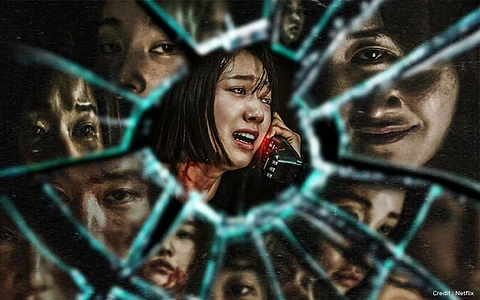
- In-Depth Stories
- Web Stories
- Reviews
- News
- FC Lists
- Interviews
- Features
- FC SpecialsFC Specials

Director: Lee Chung-hyun
Cast: Park Shin-hye, Jeon Jong-seo, Kim Sung-ryung
Streaming On: Netflix
You expect a supernatural premise – especially one based on two women from different time periods in the same house connecting over phone calls – to strive for a sense of humanity. Its mechanism alone is designed to sustain a story of hope and wonder. You expect the character of the past to be amazed by the world of the future. You expect the character of the future to guide and protect the destiny of the past. You expect a bond to arise from their power to alter the fabric of each other's universes. The first thirty minutes of The Call does as expected: it replaces the romance of The Lake House with a budding friendship. It's tender and playful.
Early on, 28-year-old Seo-yeon (Park Shin-hye) from 2019 tells a bewildered 28-year-old Young-sook (Jeon Jong-seo) from 1999 about smartphones ("there's a computer in the phone?") and video chats. She even convinces Young-sook of their freakish situation by googling a date in 1999 and predicting a plane crash that is yet to happen. When Seo-yeon mentions that her father died in a freak gas explosion in the kitchen, Young-sook, who is nearby on the same day 20 years ago, decides to pop into their house and switch off the stove. Suddenly, Seo-yeon in 2019 is confronted with a brand new fate: her beloved father is alive and healthy, and her life becomes much brighter than it was.
But you don't expect a supernatural premise to be the foundation of a serial-killer thriller. It's an odd marriage of genres: the cinematic equivalent of a noun following a noun. Similarly, you don't expect a serial-killer thriller to adopt the language of a supernatural drama. Much of The Call's audacity is derived from this artistic conditioning of our heads. Once Seo-yeon's broken life abruptly transforms into a perfect one, she has no time to answer Young-sook's calls. And while Seo-yeon occupies a coming-of-age universe, Young-sook's was always a horror film: she is mentally not right, and therefore tortured by her stepmother who believes that black magic will cure her. She begs for help. Little does Seo-yeon know that her timely intervention – to rescue Young-sook from certain doom – might actually trigger a supervillain-origin story. This is when The Call makes a mockery of expectations. In a way, Young-sook turning into a psychopath is the supernatural film striving for a sense of humanity. Trust the South Koreans to locate an odd but strangely striking marriage of genres.
Once we are aware of the direction this film chooses, the cat-and-mouse game between the two women runs the risk of becoming repetitive. You know Young-sook is going to mess with Seo-yeon's past and in turn hold her future hostage. You know the shock will wear off. The Call does get caught in circles, even though the craft (Young-sook's stylized madness) attempts to take over. That's the drawback of high-concept movies: the gimmick tends to overwhelm the emotional core of the story. The most imaginative of plots can ring hollow if they aren't rooted in reality. That's why we see storytellers like Christopher Nolan use a parent-child equation – the loudest of beating hearts – to offset the highly cerebral body. The question always remains: Is the destination profound enough to earn the complex, twisted journey?
30-year-old director Lee Chung-hyun, too, fashions a parent-child conflict at the center of The Call. It's not as obvious though. The film opens with Seo-yeon returning to her childhood village to care for her ailing mother – a mother she resents, and dislikes, and holds responsible for the father's accidental death. She only yearns for the father, which is why the estranged mother-daughter relationship feels like a ghost that haunts the film: we can't see it until it's almost too late. It's convincing, it creeps up on us, and just about softens the meandering novelty of the narrative.
A sinister post-credits scene threatens to undo the film's hard-earned payoff. But I'm going to chalk that down to the eagerness of a young, talented filmmaker who refuses to quit while he's ahead. Like an artist addicted to defying the gravity of logic, he just couldn't resist a final flourish. It's arrogant but also endearing. After all, "twist" may be a verb in life but it's a seductive noun of storytelling.